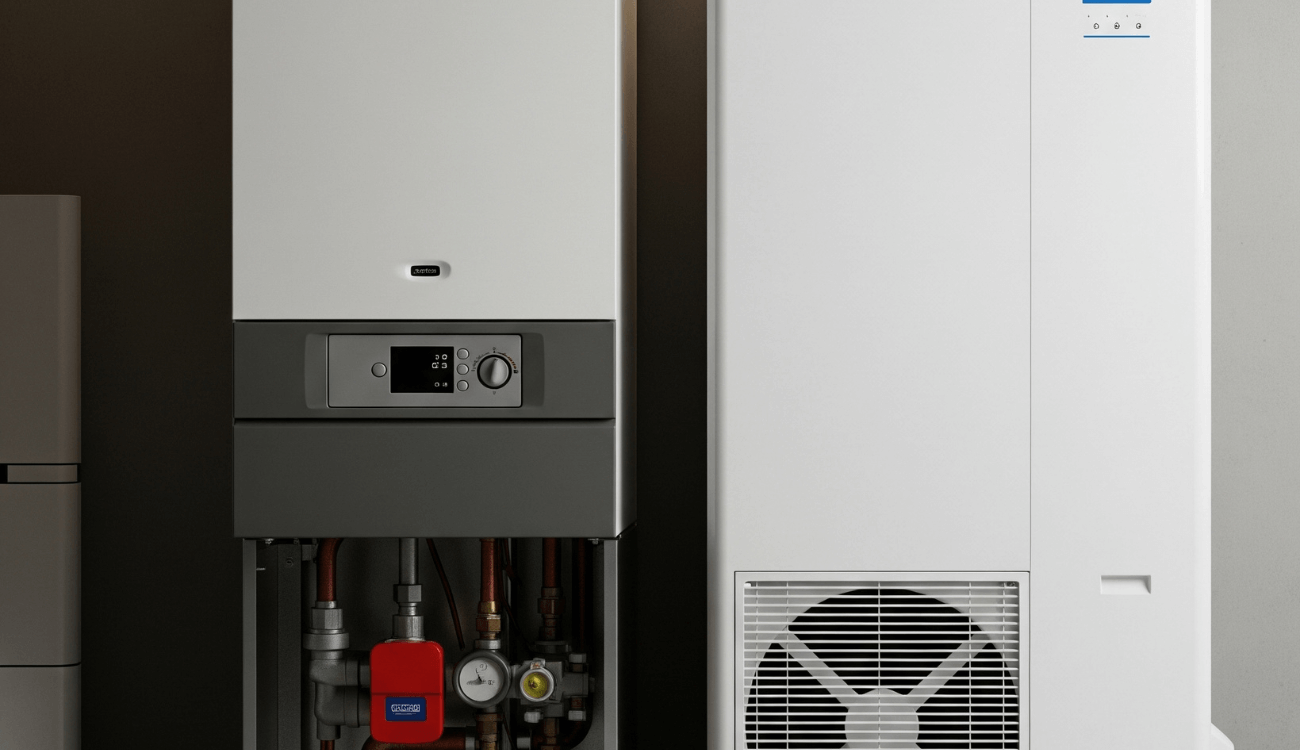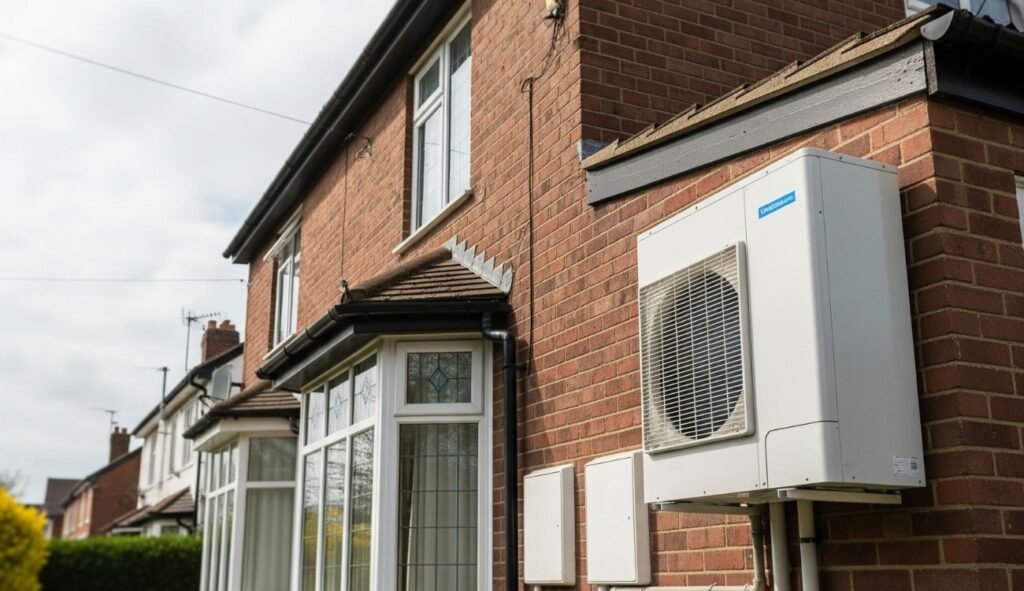Switching from a traditional gas boiler to an air source heat pump (ASHP) is an increasingly popular decision among UK homeowners, landlords, and commercial property owners.
Whether you’re looking to cut down on carbon emissions, reduce long-term energy bills, or future-proof your property, understanding the cost to replace a gas boiler with a heat pump is essential for making an informed investment.
How Much Does It Cost To Replace A Gas Boiler With An Air Source Heat Pump?
Replacing a gas boiler with an air source heat pump in the UK typically costs between £8,000 and £18,000, depending on your property size, existing infrastructure, and insulation levels.
| Property Type | ASHP System Size (kW) | Estimated Cost (Incl. Installation) |
|---|---|---|
| 1-bed flat (low demand) | 5–6 kW | £8,000 – £10,000 |
| 2–3 bed semi-detached | 7–9 kW | £10,000 – £13,000 |
| 4-bed detached | 10–12 kW | £13,000 – £16,000 |
| Large commercial property | 14–20+ kW | £16,000 – £25,000+ |
Need help deciding? Homeowners and landlords in Tyne and Wear, Newcastle, and the wider North East can request a free quote from Future Heat, a trusted ASHP installer in the region.
Factors That Affect The Cost To Replace A Gas Boiler With A Heat Pump
While the average cost to replace a gas boiler with an air source heat pump ranges from £8,000 to £18,000 for residential properties, several key factors influence where your property will fall within that range.
Understanding these variables is crucial before committing to an installation, as they can significantly impact both initial costs and system performance.
1. Property Size and Layout
Larger properties require more heating power, meaning a higher-capacity heat pump and potentially more internal upgrades.
- Example: A one-bedroom flat may only need a 5–6 kW system, while a four-bedroom detached home might require a 12 kW unit.
- More rooms = more pipework, radiator upgrades, and installation time.
If you want to understand more about sizing, check out our guide on what size air source heat pump you will need.
Tip: A more compact, open-plan home tends to be more cost-effective to retrofit than a large, multi-storey building with complex zoning requirements.
2. Insulation and Heat Loss Rate
ASHPs operate best in well-insulated homes, where less energy is wasted. Poor insulation increases heating demand, leading to:
- The need for a larger (more expensive) heat pump
- Higher running costs
- Potential performance issues
Before installation, assess your EPC rating or request a Heat Loss Survey, often done by MCS-certified installers.
You might find our guide on determining whether your house is suitable for a heat pump useful here.
3. Existing Heating System Infrastructure
If your current setup is outdated or incompatible, additional work may be required.
| Component | Upgrade Needed? |
|---|---|
| Gas boiler & flue | Removed entirely |
| Radiators | May need resizing for low-temperature flow |
| Pipework | Older pipes may need replacement |
| Thermostat/controls | New compatible controls installed |
Homes with modern pipework and radiators may avoid these extra costs. However, older homes (especially pre-1980s) often need substantial upgrades. To get a better understanding, read our article on how heat pumps work with radiators.
4. Hot Water Storage Requirements
Unlike combi boilers, most air source heat pumps work with a hot water cylinder to store domestic hot water. If you don’t already have one, you’ll need to:
- Allocate space (e.g. airing cupboard)
- Install a compatible cylinder (£800–£1,200)
Some compact or smaller homes may face logistical challenges in fitting a cylinder.
5. Installation Complexity & Labour Costs
- Is the outdoor unit easily accessible?
- Will flooring need to be lifted for pipework?
- Are scaffolding or planning permissions needed?
Complex projects can increase labour time and costs. A simple swap in a modern home may take just 3 days, while a full retrofit in a Victorian terrace could take 5+ days.
For more on installation considerations, read our articles on whether you can install an air source heat pump yourself and how much space does an air source heat pump require.
6. Grants and Subsidies
If you’re eligible for the Boiler Upgrade Scheme (BUS), you can get £7,500 off the upfront cost, significantly reducing your out-of-pocket expenses. Only MCS-certified installers can apply on your behalf.
7. Location and Installer Rates
Labour and service costs can vary by region. For example, properties in London or the South East often see higher installer fees than those in the North of England.
What Are The Installation Costs Involved?
Installation costs for air source heat pumps vary based on:
- Whether you’re retrofitting or building new
- The complexity of removing your old gas boiler
- Radiator and underfloor heating compatibility
- Pipework and insulation upgrades
| Installation Factor | Estimated Cost |
|---|---|
| Removal of gas boiler & pipework | £500 – £1,000 |
| Heat pump unit installation | £3,000 – £7,000 |
| Hot water cylinder replacement | £800 – £1,200 |
| Radiator/underfloor heating upgrade | £1,500 – £4,000 |
According to Gov.uk, properties that are well-insulated can see simpler installations and lower costs. Always consider a home energy efficiency assessment before switching.
How Do Energy Needs Affect Heat Pump Size & Cost?
The size of the heat pump you need depends on your home’s annual heat demand, insulation level, and square footage. An undersized pump will work inefficiently, while an oversized one wastes energy.
| Property Size | Annual Heat Demand (kWh) | Recommended ASHP Size | Estimated Cost (Unit + Install) |
|---|---|---|---|
| 1-bed flat | 6,000 – 8,000 | 5–6 kW | £8,000 – £10,000 |
| 2-bed terraced house | 9,000 – 11,000 | 7 kW | £9,000 – £12,000 |
| 3-bed semi-detached | 12,000 – 15,000 | 8–9 kW | £10,000 – £13,000 |
| 4-bed detached | 16,000 – 20,000+ | 11–12 kW | £13,000 – £16,000+ |
Use Ofgem’s energy consumption statistics as a baseline to estimate your household demand.
Our guides on choosing the appropriate heat pump size and assessing whether your home is suitable for a heat pump can provide valuable insight.
Are Air Source Heat Pumps More Efficient Than Gas Boilers?
Yes, air source heat pumps are significantly more energy efficient than traditional gas boilers.
While a modern condensing gas boiler operates at around 90–92% efficiency, according to Energy Saving Trust, a well-installed air source heat pump can reach a Coefficient of Performance (COP) between 3.2 and 3.8.
This means that for every 1 kWh of electricity consumed, the system produces 3.2 to 3.8 kWh of heat, depending on usage and conditions.
That’s up to 380% efficiency, which is possible because heat pumps transfer energy rather than generate it by burning fuel.
| System Type | Efficiency | Carbon Emissions |
|---|---|---|
| Gas Boiler | 90–92% | 0.21 kg CO₂/kWh (natural gas) |
| Air Source Heat Pump | 320–380% (COP 3.2–3.8) | 0.10 kg CO₂/kWh (UK average electricity mix) |
According to National Grid ESO, the UK’s electricity mix continues to decarbonise, which means the environmental advantage of ASHPs over gas boilers will only grow over time.
For a deeper dive into efficiency and environmental impact, read our article on air source heat pump efficiency.
How Much Money Can You Save By Switching To An ASHP?
Savings vary based on your current heating method and tariff. According to the Energy Saving Trust, switching from a gas boiler to an ASHP can save:
- £295–£425/year for a typical 3-bed home on standard tariff
- £500–£800/year if switching from LPG or oil boilers
You can boost savings by pairing your ASHP with smart meters and off-peak tariffs like Octopus Go or Economy 7.
Take a look at our guides on heat pump running costs and how much electricity an air source heat pump uses for more on running expenses.
What Are The Long-Term Maintenance Costs Of ASHPs?
Air source heat pumps require annual maintenance to ensure optimal performance. While generally low-maintenance, routine servicing helps prevent performance drop-offs and extends lifespan (which averages 15–20 years).
| Maintenance Task | Recommended Frequency | Estimated Cost |
|---|---|---|
| Filter & coil cleaning | Yearly | Included in service |
| Refrigerant & pressure checks | Yearly | £100 – £150/year |
| Software/thermostat updates | As needed | Often remote |
According to the Microgeneration Certification Scheme (MCS), a certified installer like Future Heat will also offer ongoing maintenance plans for homeowners in the North East.
Frequently Asked Questions (FAQs)
Sometimes. If your radiators are oversized or already suitable for lower flow temperatures, they can be reused. However, many homes require radiator upgrades for maximum efficiency.
Generally, no. Most air source heat pump installations fall under permitted development rights. Exceptions include listed buildings or conservation areas. Always check with your local authority.
TYes, modern ASHPs can heat both space and domestic hot water. Most systems will include or require a compatible hot water cylinder.
While they do generate sound, most modern ASHPs operate at around 40–50 dB, which is quieter than a typical gas boiler or fridge. Proper placement helps mitigate any noise issues.
Installation typically takes 3–5 days, including removal of the existing gas boiler and commissioning the new system.
Our Verdict
Upgrading from a gas boiler to an air source heat pump is a smart, energy-efficient, and environmentally friendly investment for UK property owners.
While the initial cost to replace a gas boiler with a heat pump may seem significant, the long-term savings, efficiency gains, and access to government funding make it a compelling choice.
If you’re located in Tyne and Wear, Newcastle, or the wider North East, take the next step with Future Heat, your trusted local installer. Request your free quote today and move toward a greener, lower-cost future.
Jamie Maguire is Managing Director at Future Heat Ltd, the UK-based renewable energy company specialising in heat pumps, solar panels and energy-efficient boiler solutions. He leads the company’s strategic vision to decarbonise homes and businesses across the UK by delivering innovative, sustainable heating and power systems. Jamie is passionate about shaping the future of energy, supporting communities and empowering teams of skilled engineers to deliver lasting value and carbon reductions nationwide.











